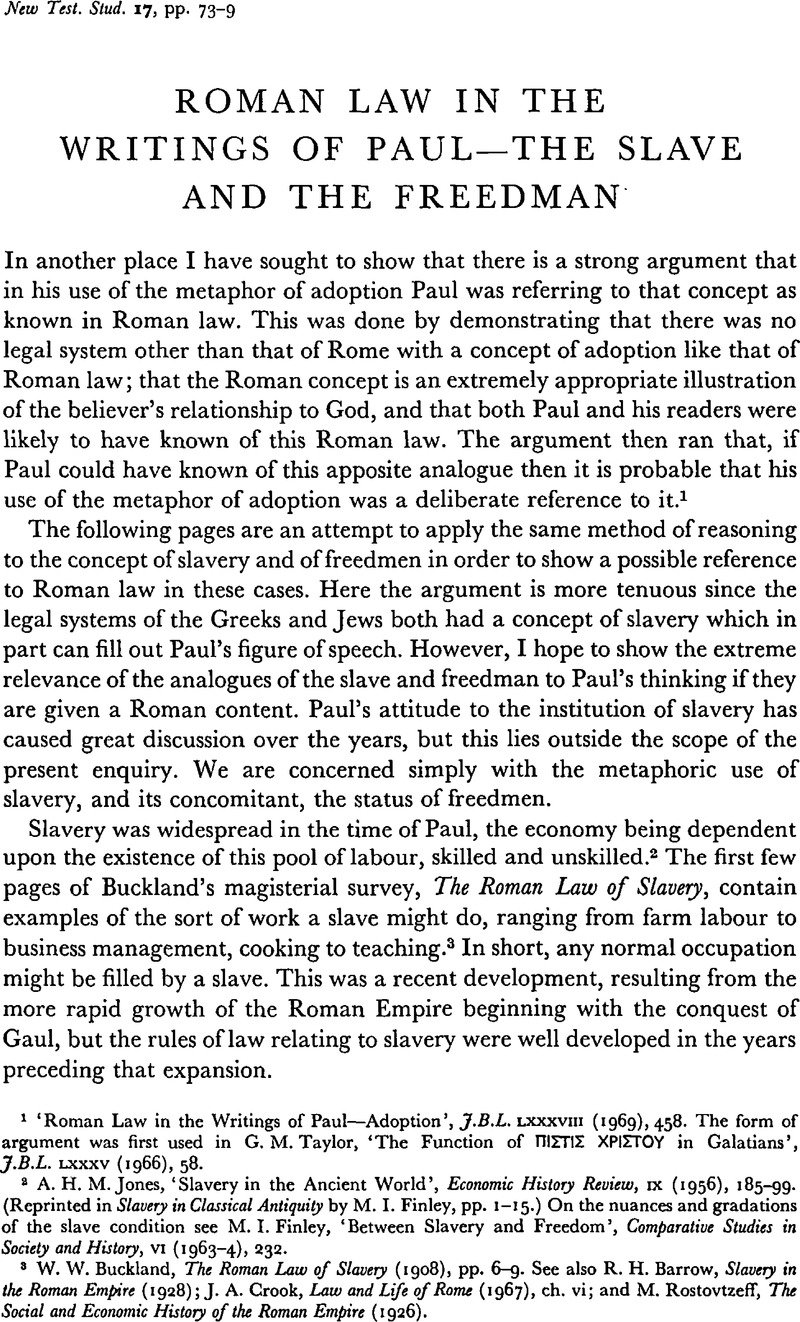No CrossRef data available.
Article contents
Roman Law in the Writings of Paul—The Slave and the Freedman
Published online by Cambridge University Press: 05 February 2009
Abstract

- Type
- Short Studies
- Information
- Copyright
- Copyright © Cambridge University Press 1970
References
page 73 note 1 ‘Roman Law in the Writings of Paul—Adoption’, J.B.L. LXXXVIII (1969), 458Google Scholar. The form of argument was first used in Taylor, G. M., ‘The Function of ΠλΣΤIgr;Σ κΡλΣΤΟΓ in Galatians’, J.B.L. LXXXV (1961b), 58.Google Scholar
page 73 note 2 Jones, A. H. M., ‘Slavery in the Ancient World, Economic History Review, IX (1956), 185–99CrossRefGoogle Scholar. (Reprinted in Slavery in Classical Antiquity by M. I. Finley, pp. 1–15.) On the nuances and gradations of the slave condition see Finley, M. I., ‘Between Slavery and Freedom,’ Comparative Studies in Society and History, VI (1963–1964), 232.Google Scholar
page 73 note 3 Buckland, W. W., The Roman Law of Slavery (1908), pp. 6–9Google Scholar. See also Barrow, R. H., Slavery in the Roman Empire (1928)Google Scholar; Crook, J. A., Law and Life of Rome (1967)Google Scholar, ch. vi; and Rostovtzeff, M., The Social and Economic History of the Roman Empire (1926).Google Scholar
page 74 note 1 Romans vi. 16–22.
page 74 note 2 Colossians iv. 1; cf. Ephesians vi. 9.
page 74 note 3 Romans i. 1; Philippians i. 1; cf. Ephesians vi. 5–8.
page 74 note 4 Leviticus xxv. 25 ff.; cf. Job xix, 25, Isaiah lix, 20, Ruth iv. See Neufeld, E., ‘Ius redemptionis in Ancient Hebrew Law,’ Revue internationale des droits de ĺ antiquité, VIII (1961), 29Google Scholar; cf. Yaron, R., ‘Redemption of Persons in the Ancient Near East,’ loc. cit. VI (1959), 155.Google Scholar
page 74 note 5 Daube, D., Studies in Biblical Law (1947), pp. 39–62.Google Scholar
page 74 note 6 E.g. Isaiah xliii. 1; lii. 3; lix. 20. Jeremiah xxxi. 10–11; 1. 33–4. Psalm cvii. 1–3.
page 74 note 7 T. Mommsen,! History of the Roman Empire; The Provinces of the Roman Empire, both s.v. ‘Corinth’. Reid, J. S., The Municipalities of the Roman Empire (1913), p. 427Google Scholar. Levick, B., Roman Colonies in Southern Asia Minor (1969), p. 4.Google Scholar
page 75 note 1 Colossians iv. 1 and Ephesians vi. 9. Cf. I Timothy vi 1–2, where Paul tells Timothy what he ought to teach slave believers.
page 75 note 2 Gaius, Institutes, 1. 9. The standard English edition of the Institutes is de Zulueta, F., The Institutes of Gaius (1958–1963)Google Scholar. As stated in my earlier article at n. 2, Gaius wrote about A.D. 160–2 (Honoré, A. M., Gaius (1962)Google Scholar), but the fact that he postdates Paul by about a century is offset by his interest in the development of the law and the references he makes to historical matters. Other earlier writers are quoted in Justinian's various compilations of the law, but they do not contradict what Gaius tells us.
page 75 note 3 Gaius, Institutes, I. 52 ff.
page 75 note 4 I Corinthians vii. 24: Romans vii. 14.
page 76 note 1 See p. 74 n. 2.
page 76 note 2 Gaius, loc. cit. Buckland, W. W., A Textbook of Roman Law from Augustus to Justinian (1963), ed. P. Stein, 61–6Google Scholar. Watson, A., The Law of Persons in the Later Roman Republic (1967), pp. 173–84Google Scholar.
page 76 note 3 Boaz, Cohen, Jewish and Roman Law (1966)Google Scholar, ch. vi, ‘The Law of Persons’, ch. vii, ‘Civil Bondage’, and ch. viii, ‘Peculium’. Horowitz, G., The Spirit of Jewish Law (1953, 1963), pp. 244–52Google Scholar. Falk, Z. W., Hebrew Law in Biblical Times (1964), pp. 117–22.Google Scholar
page 77 note 1 Jones, J. W., Law and Legal Theory of the Greeks (1956), pp. 277–86Google Scholar; Harrison, A. R. W., The Law of Athens: Family and Property (1968), pp. 163–80.Google Scholar
page 77 note 2 The RSV variant reading in verse 21b, which replaces ‘avail yourself of the opportunity’ by ‘make use of your present condition instead’, does not affect the matter; though, if the argument following is correct, the variant is given some support. I prefer to look on 21b as an interjection, taking verse 22 to indicate the parity of slave and freeman in Christ's eyes. This is a matter of great interest to the slave addressed in verse 21a, but of lesser importance to the freeman. Paul therefore flattens the freeman in 22b.
page 77 note 3 See the comparison in Cohen, op. cit. pp. 146–55.
page 78 note 1 Horowitz, op. cit. pp. 246–9.
page 78 note 2 Harrison, op. cit. ch. vii ‘Freedmen’, pp. 181 ff. Taubenschlag, Cf. R., The Law of Greco-Roman Egypt in the Light of the Papyri (1955), pp. 96–101Google Scholar; Westermann, W. L., ‘Slavery and the Elements of Freedom in Ancient Greece’, Quarterly Bulletin of the Polish Institute of Arts and Sciences in America (01, 1943), pp. 1–16 (more conveniently obtained reprinted in Slavery in Classical Antiquity by M. I. Finley)Google Scholar; Finley, M. I., ‘The Servile Statuses of Ancient Greece,’ Revue internationale des droits de'antiquité, VII (1960), 165.Google Scholar
page 78 note 3 Jones, op. cit. pp. 212–13. Welles, C. B., ‘Manumission and Adoption,’ II (1949)Google Scholar, Mélanges F. de Visscher (3 (1949), Revue internationale des droits de 'antiquité), pp. 512–20. Westermann, W. L., ‘The Paramone as a General Service Contract,’ Journal of Juristic Papyrology, II (1948), 9.Google Scholar
page 78 note 4 Harrison, op. cit. pp. 184–6.
page 78 note 5 Duff, A. M., Freedmen in the Early Roman Empire (1928), pp. 36 ff.Google Scholar; Buckland, W. W., A Textbook of Roman Law from Augustus to Justinian, pp. 87–90Google Scholar. (It must be remembered that Paul wrote at the very beginning of the period covered by these works.) Watson, A., The Law of Persons in the Later Roman Republic (1968), pp. 226–36.Google ScholarTreggiari, S., Roman Freedmen during the Late Republic (1969), pp. 68–81.Google Scholar


